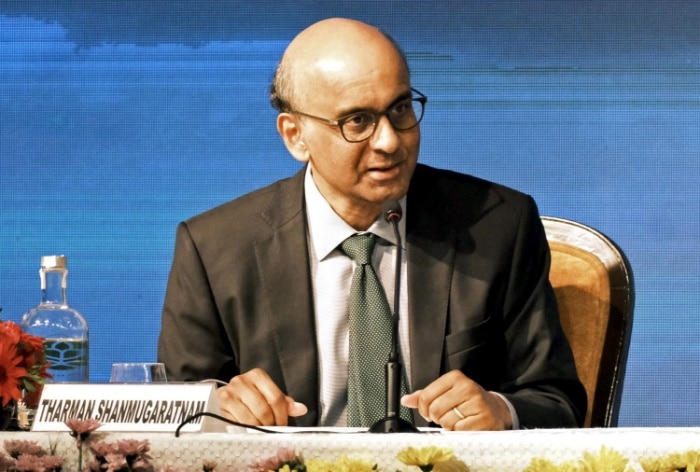Tharman Shanmugaratnam, an Indian-origin Singapore-born economist, formally launched his presidential campaign in July with a pledge to evolve Singapore culture.

New Delhi/Singapore: Indian-origin politician Tharman Shanmugaratnam is part of a three-way race to become next president of Singapore as polls for presidential elections– the first since since 2011– closed on Friday.
Singaporeans voted in large number to elect a new head of the state for the city-state in nearly 12 years. The voting closed at 8 PM (local time) as ballot boxes were sealed and transported to counting centres, where a sample count will be done to get an early indication of the possible outcome.
The polls ended with over 2.7 million voters casting their ballots in Singapore’s first presidential election in 12 years as the last one in 2017 – which was reserved for Malay candidates – was uncontested.
Incumbent President Madam Halimah Yacob was the only eligible candidate and she was sworn in after the Nomination Day on September 13, 2017. Halimah decided not to seek a second term.
The three candidates for the 2023 presidential election are former senior minister Tharman, former chief investment officer with the Government of Singapore Investment Corp (GIC), and former chief of the NTUC Income, a state-owned union-based insurance group, Tan Kin Lian.
Eligible voters started casting their ballots at 8 AM when polling stations opened. Voting is compulsory for which the government has declared Friday a public holiday. After a shaky start, plagued by issues with the voter registration system and subsequent long queues, lines at polling centres eased by around 10 AM.
Among those who turned up at the polling stations early in the morning were President Halimah and Prime Minister Lee Hsien Loong.
A total of 31 special polling stations have been set up in nursing homes for the Presidential Election.
Singaporeans will get an early indication of the outcome of the presidential election at around 10 PM to 11 PM, before the final count is in.
The Elections Department (ELD) website will publish the results of a sample count, which is expected to be completed two to three hours after polling closes at 8 PM, according to a report by The Straits Times newspaper
Apart from Tharman, two other candidates in the race for the country’s ninth President are Ng Kok Song, , and Tan Kin Lian.
President Halimah’s six-year term will end on September 13. She is the country’s eighth and first female president.
Who is Tharman Shanmugaratnam?
66-year-old Tharman Shanmugaratnam, an Indian-origin Singapore-born economist, formally launched his presidential campaign in July with a pledge to evolve the country’s culture to keep it a “shining spot” in the world.
Tharman, who joined politics in 2001, has served in the public sector and ministerial positions with the ruling People’s Action Party (PAP) for over two decades.
Tharman supports his qualification to be the next president of the prosperous state by citing his international experience across various fields including pandemic preparedness and human development.
He also has experience in the government and with the city state’s foreign reserves, estimated to be over Singapore dollars 2 trillion.
Tan pointed to his 30-year experience as chief executive of NTUC Income.
While Ng and Tan have maintained their “no-political affiliation”, Tharman, who served as Singapore’s Deputy prime minister between 2011-2019, resigned in July from public and political posts to run for the presidency.
All three candidates have been chosen under strict criteria. Singapore has a stringent qualification process for candidates vying for the presidency.
Past Indian-origin presidents
Singapore in the past has had two Indian-origin presidents.
Sellapan Ramanathan, popularly known as S R Nathan, a Singaporean politician and civil servant of Tamil descent served as the president of Singapore. In 2009, Nathan defeated Benjamin Sheares to become Singapore’s longest-serving president.
Chengara Veetil Devan Nair, better known as Devan Nair, served as the third president of Singapore from 1981 until his resignation in 1985. Born in 1923 in Malacca, Malaysia, Nair was the son of a rubber plantation clerk, who was originally from Thalassery, Kerala.
The president has a mainly ceremonial role in the city-state with few powers and little say in public affairs.
However, the presidential election is being seen as a referendum on the party that has ruled the island nation for more than six decades. The next general election is due in Singapore by 2025.
Chinese people account for about 75 per cent of Singapore’s multi-racial population. An estimated 13.5 per cent are Malays and about nine per cent are Indians, with others making up the remainder.
This year, the election was opened to all ethnicities.
Singapore, with no resources, sits in the midst of resource-rich Asia and has grown into an Asian financial hub with links to the world’s two largest markets – China and India.
The first presidential election in Singapore was held on August 28, 1993.
(With PTI inputs)
